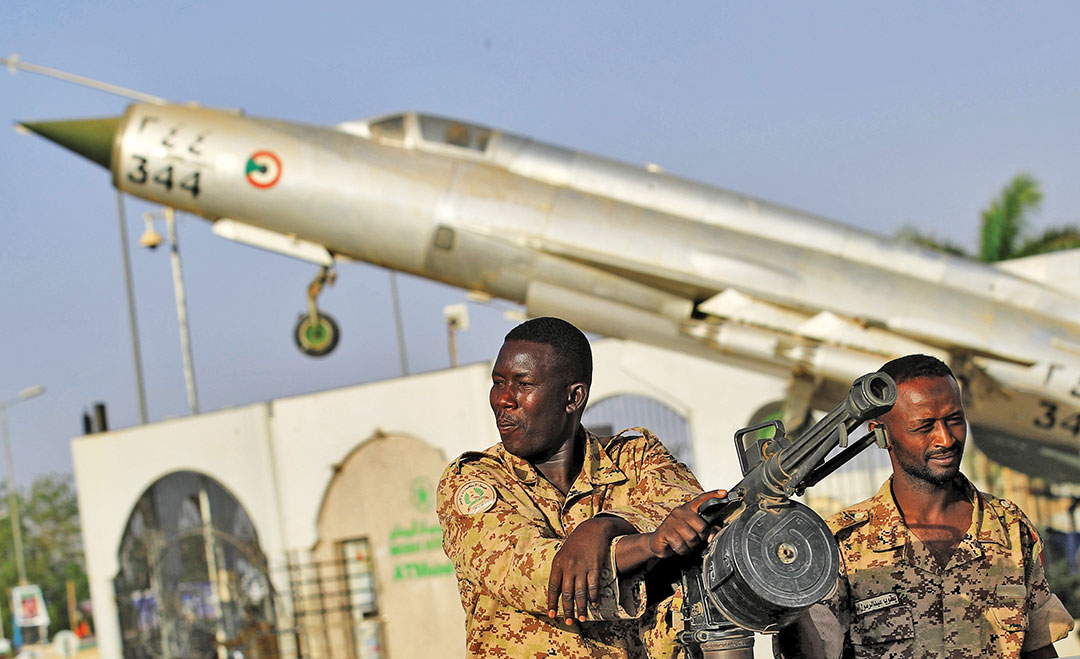ADF STAFF
From farm fields to oil fields, Sudan’s military is deeply rooted in industries at the heart of the country’s economy. The military-controlled Defense Industries Systems (DIS) runs more than 250 companies worth a collective $2 billion that produce a wide variety of equipment for military and civilian use. Along with producing military equipment, DIS companies are involved in gold, marble, leather, gum arabic and household appliances.
DIS also is invested in telecommunications, banking, water distribution, real estate development, aviation, transportation, pharmaceuticals and textiles. In addition, DIS controls 60% of Sudan’s wheat imports.
“They are everywhere one looks,” Jean-Baptiste Gallopin, a researcher with the European Council on Foreign Relations, wrote in an analysis of Sudan’s political and economic situation.
Through those enterprises, the military earns off-budget revenue to finance operations. At least 50 companies fund the Rapid Support Forces run by Gen. Mohammed Hamdan Dagalo, also known as Hemedti. All of that revenue is untaxed.
After the overthrow of longtime ruler Omar al-Bashir, Sudan’s civilian leaders announced an ambitious agenda ahead of elections planned for 2023 — an agenda that included divesting the military’s civilian business dealings and taxing them.

Gen. Mohammed Fattah al-Burhan ended those plans in 2021 when he dissolved the ruling Sovereignty Council, arrested Prime Minister Abdalla Hamdok and shut down investigations into military activities.
Since the coup, protests against the junta have become a regular part of life in Sudan.
Sudan’s experience illustrates the risk militaries pose to civilian rule and to their own credibility when they go into business for themselves.
Sudan is not unique. From Cuba to Zimbabwe, dozens of militaries in Asia, Africa, and Central and South America engage in business for a variety of reasons:
National governments are unable to fully fund the military and encourage it to raise its own money through business dealings.
A lack of professionalism allows members across the military to engage in an “every-man-for-himself” style of entrepreneurship.
Civilian and military leaders develop a symbiotic relationship that keeps civilians in power while letting the military run its own affairs. In some cases, civilian leaders believe allowing the military to profit from its position is “coup-proofing” their governments.
“Military involvement in the economy functions as a survival strategy for leaders and a profit-making scheme for the military,” researcher Roya Izadi wrote in the Journal of Conflict Resolution.
According to Izadi, 47 militaries launched their own business enterprises between 1950 and 2010. South Sudan’s and Ghana’s militaries began their own business ventures after 2010. Argentina, Haiti, India, Paraguay and Uruguay are among the handful of countries that ended military business in recent decades.
Although military business may solve a government’s funding problems in the short term, it creates many more problems in the long term, according to experts.
Historical examples show that as the military’s business interests grow, the corruption it fosters degrades military readiness as the chain of command focuses more on making money than on defending the nation. By driving out private enterprise, military business damages the civilian-military relationship.
Over time, military business becomes predatory as the armed forces monopolize resources to the detriment of the country, according to Ayesha Siddiqa, author of “Military Inc.: Inside Pakistan’s Military Economy.”
“Military economic power spirals outward,” Siddiqa told ADF in an interview. “The more you try to make them happy, the more they become greedy.”

Origins of Military Business
Pakistan’s National Logistics Cell (NLC) was created in 1978 to develop the roads, railways and other infrastructure needed to break transportation bottlenecks at the port in Karachi when civilian authorities proved incapable of doing so. Nations often turn to the military in crises, providing them with an entry point into the national economy.
The NLC, which was created by the Pakistani military’s quartermaster-general, is an example of how the military gets into business. Rather than disband after the crisis, the NLC expanded its operations dramatically.
Pakistan’s repeated wars with India reveal another reason militaries go into business: to fund everything from daily operations to veterans’ benefits. Through a network of foundations and subsidiaries, Pakistan’s military raised an estimated $20 billion in 2017 alone. The official defense budget that year was $11.5 billion.
In countries with weak governments, civilian leaders see military business as a way to keep the armed forces happy, according to Izadi. In the end, however, military business becomes a double-edged sword.
“Financial autonomy gives the armed forces a sense of power and confidence of being independent of the ‘incompetent’ civilians,” Siddiqa said. “While the military can pretend it’s adding to national security, actually, it’s adding to the threat.”
Military Business and Corruption
Pakistan serves as an example of how military business develops and a warning about what can happen if it goes unchecked.
Since the late 1970s, Pakistan’s Army, Navy and Air Force have competed for revenue by expanding their business holdings into every corner of the national economy.
When Pakistanis buy shoes, book vacations or do their banking, they put money into the military. When they ship goods, the NLC — among the largest public-sector transportation fleets in Asia — does the job with its staff of 2,500 active-duty Soldiers. When Pakistanis fly, either an Army or Air Force pilot is at the controls, depending on the airline.
With close ties to the government and a workforce subsidized by taxpayers, Pakistan’s military enterprises easily out-compete other companies for government contracts. State-owned Pakistan Railways, for example, carried 65% of the nation’s freight in 1980. Between its truck network and rail service, the NLC reduced Pakistan Railways to carrying less than 15% of the nation’s freight by 2010.
“The NLC is pushing out all other competitors,” Siddiqa told ADF.
The reach of military businesses in Pakistan shifts vast amounts of money that would otherwise fuel private enterprise into the pockets of retired and active officers at the top of the military business system, experts say.
The military’s focus on making money feeds corruption and undermines Pakistan’s military preparedness. Junior officers game the military’s procurement system to curry favor with higher-ups who control advancement and other perks, such as the distribution of lucrative agricultural land, said Siddiqa, the former head of Pakistan’s Office of Naval Research.
“Up to the rank of captain, officers made correct procurement assessments,” Siddiqa told ADF. “From captain onward, suddenly everything goes topsy-turvy.”
By putting Soldiers to work as road builders and dry-cleaning clerks instead of having them train for missions, Pakistan’s military leaders are undercutting the country’s military preparedness, Siddiqa said.
“When militaries run businesses, their economic interests compete with their national security obligations,” Izadi writes.

Reining in Military Business
“Once a military becomes an economic player, it is extremely hard for governments to convince them to abandon economic activities,” Izadi writes. “It is extremely hard for leaders to confiscate the companies under the ownership of the military.”
That’s true even as deeply rooted military business makes a country less attractive to foreign investment and cripples the relationship between the military and civilian population, according to a study by Transparency International (TI).
Consider Indonesia: According to TI, the government committed in 2004 to shutting down the business operations of its military, the Tentara Nasional Indonesia (TNI), to make it fully accountable to the civilian population.
After five years of inaction, the government let the TNI reorganize its enterprises into 23 foundations and 1,000 military cooperatives with the understanding that any revenue earned would go into the state treasury. By 2019, the TNI remained firmly in control of its business ventures, according to researcher Meidi Kosandi of the University of Indonesia.
“After 20 years of political reform in Indonesia since 1998, it appears that the army has not shown strong commitment towards the principle of non-participation in business,” Kosandi wrote in his 2019 analysis.
State power is a key factor in the evolution and control of military entrepreneurship, Kristina Mani, an expert in military business at Oberlin College, told ADF. Weak governments are unable to reshape their militaries or end military business activities, she said.
“Reforming any institution involves reconfiguring power relations,” said Mani, who has studied military business activities in China, Pakistan and El Salvador. “Civilian governments can do that if they’ve got a lot of domestic legitimacy or good international support with real influence.”
Countries that have stopped military business had to take drastic steps to do so. Haiti, for example, disbanded its military entirely in 1995 in part to put a stop to military business. In other cases, civilian governments and their armed forces spent many years negotiating an end to the military’s off-budget business interests.
“Highly professional militaries are more likely to pursue economic activities for institutional rather than individual ends,” Mani said. “In strong states, a military will be more beholden to goals determined by state officials rather than to its own interests.”
Reducing military business benefits the armed forces and the civilian government to whom they should be accountable. That’s because, in the long run, military business delegitimizes the militaries that practice it, Siddiqa told ADF.
“It creates friction, which is not healthy for the military or the state,” she said.

